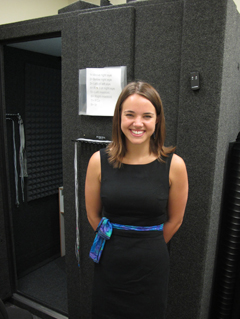
EEG Technician
On June 1, 2012, the Department of Psychiatry and Behavioral Science opened a new EEG facility in Putnam Hall on Stony Brook University’s south campus. This facility is the only one of its kind at the department currently. It will support two research projects of the Psychiatric Epidemiology Division: the Suffolk County Mental Health Project, an epidemiological study of long-term recovery from mental illness, and the ADEPT project, a longitudinal study of personality development, well-being, and depression in adolescent girls. Roman Kotov, PhD is the principal investigator for both projects. The EEG facility will be overseen by Associate Professor Greg Hajcak, PhD from the Department of Psychology and Greg Perlman, PhD, a post-doctoral fellow in the Department of Psychiatry and Behavioral Science. EEG technician Emily Hale-Rude will be responsible for conducting the assessments and for the day to day administration of the facility. Time slots are available for other researchers who are interested in conducting research in the facility (they can contact Dr. Kotov for more information).
The facility uses an ActiveTwo system from BioSemi, a state-of-the-art EEG system with 32 primary channel (plus 8 auxiliary channels); BrainVision Analyzer software to assist with the interpretation of data; and a WhisperRoom sound isolation booth that filters out ambient noise to reduce distractions and improve data quality.
The new facility is not the department’s first. Max Fink, MD set up an EEG facility when he came to Stony Brook in the early 1970’s. He brought an IBM 1800 computer with him from New York Medical College and staffed nine computer programming and technical positions with funds from NIMH grants. The computer was programmed for both power spectrum density analyses and period analyses of EEG signals in patients and volunteers to describe the changes induced by psychoactive drugs. Federal funding for the project was severely reduced in the mid-1970’s and the facility was eventually closed in 1983.
The new EEG facility will use event-related potentials (ERP) to study emotional processing and cognitive functioning in research participants. In the Suffolk County Mental Health Project, researchers will investigate recovery of neural functioning in people who experienced serious mental illness. In the ADEPT study, they will attempt to identify biomarkers associated with risk and protective factors for development of depression.